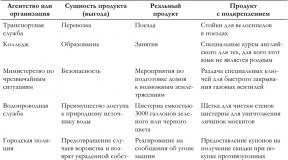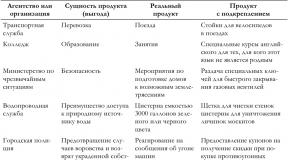Tax audit methodology. Tax audit: types, features. How is a tax audit of an organization
If the leaders of the company have decided to check whether everything is in order with the tax documents, then they can apply for the services of an independent verification - audit. There are some companies for which such a procedure is mandatory and they are required to go through it every year. In this article, we will consider what is an audit of tax reporting, why and how it is carried out.
Why is tax reporting audited
The main purpose of the audit of the statements is to form an opinion of a specialist (auditor) on the reliability of the company's statements, as well as whether the accounting procedure in the company complies with the legislative norms of the Russian Federation.
The main tasks of this audit include:
- determining whether the indicators of tax reporting comply with the legislation, as well as the accounting policy of the organization;
- finding out how completely and reliably business transactions are reflected in the documentation;
- checking how the internal control system is organized and operates in the company;
- checking whether the indicators in the reporting correspond to real indicators.
When conducting an audit, specialists use the same methods as when auditing a company as a whole, namely:
- control (including observation, inventory and assessment);
- documentary (includes the study of company documents);
- computational and analytical (including calculations and subsequent analysis).
Mandatory audit
An audit is mandatory for a company specified in the Law No. 307-FZ "On Auditing Activities". These include the following organizations:
- whose securities participate in organized trading;
- credit, clearing, microfinance, insurance, securities market participants, IDPs, gambling organizers, cooperatives, etc .;
- with the volume of proceeds exceeding 400 million rubles, or assets in the amount of more than 60 million rubles (data are recorded for the year preceding the reporting year).
- other companies, according to Art. 5 of Law No. 307-FZ.
Important! An audit initiated by a company is carried out in certain cases, for example, when a company plans to obtain a loan from a bank or wishes to take part in a tender. Also, the audit may be caused by the desire of the management to reduce tax risks, check the work of the accounting department or prepare documents for a potential investor.
How tax reporting is audited
The audit is carried out in several stages, each of which will be considered in detail:
- Test planning and preparation for its conduct. At this stage, the audit specialist examines the activities of the audited company. He prepares a plan of his work and requests the documents necessary for verification. At this stage, the organization enters into an audit agreement with the audit firm.
- Collection of data provided for verification and their analysis. At this stage, the list of submitted documents is being studied. Sometimes employees are interviewed, not only verbally, but also in writing. All data are formed by groups and systematized. That is, a direct check is carried out at this stage. Next, the auditor draws up an opinion on the reliability of the company's reporting.
- The auditor's report is sent to the management of the audited company. It represents the opinion of a specialist on the reliability of tax reporting. The auditor's report is handed over to the head. In addition to the conclusion, some companies also draw up an audit report, which describes in detail all the stages of verification, deficiencies identified during verification, and other information that may be useful for improving the quality of accounting.
Documents that are subject to verification during the audit
When conducting an audit of tax returns from a company, first of all, of course, you will need to provide reports. In addition to tax returns, the auditor will need financial statements (balance sheet, statement of financial results). In addition to this, you will also need to provide primary documentation, statutory documents, various permits and licenses, and much more.
Auditors check the correctness of filling out the documents, their compliance with the approved forms, as well as compliance with the deadlines for submission to the tax office.
Important! If the audit is carried out on a special assignment, then only the documentation that is directly related to the task is subject to verification.
Tax audit results
The end result of an audit is an audit report and an auditor's report. In what form the auditors will provide the final result will depend on what exactly is spelled out in the audit contract. The report is confidential and contains the following:
- methods used during verification;
- recommendations regarding changes in accounting policies, which may ultimately affect the company's tax reporting;
- proposals for adjusting tax reporting;
- other information that, in the expert's opinion, is worth paying attention to the management (for example, internal control errors, etc.).
If the auditor revealed violations during the audit, then the report offers different options for their solution... The report can be drawn up in the form of a pivot table.
Important! The report is accompanied by an auditor's opinion and copies of the company's statements for the current year.
Auditor's report
The auditor's report is an official document that contains an expert opinion on the reliability of the company's statements. This document must be submitted to the statistics authorities and attached to it your reporting. The auditor's document contains the following information:
- title of the document;
- name of the addressee;
- information about the company that was audited;
- information about the auditor (company or individual specialist) who performed the audit;
- list of documents that were checked during the audit;
- the auditor's opinion on the reliability of the information being verified;
- audit results;
- the date of the conclusion.
Violations and errors that are revealed during the audit
Typical violations identified during the audit include the following:
- incorrect reflection of the company's income and expenses;
- incorrect or incomplete filling of the details of the organization;
- errors in calculating tax amounts;
- contradictions in indicators of different reporting forms;
- difference in the size of the authorized capital from that specified in the company's charter;
- violations in the inventory (with errors or formal);
- other violations.
Company liability for non-audit
All companies listed in art. 5 of Law No. 307-FZ, are obliged to conduct an annual audit of the statements and, as a result, send it to the statistical authorities. The auditor's report is submitted together with the submission of reports. In the event that it is not possible to submit the report within this period, then this can be done within 10 days from the date of issue of the conclusion. In any case, the conclusion should be submitted to the statistical agencies no later than December 31 of the year following the reporting year.
Also, companies must enter information about the audit in the Unified Federal Register on the facts of the activities of legal entities. This must be done no later than 3 working days from the date of issue of the opinion.
If a company is required to conduct an audit, but it does not, then it faces the following penalty:
- A fine from 5 to 10 thousand rubles - if during the on-site tax audit it turned out that there is no audit report (15.11 of the Administrative Code of the Russian Federation).
- A fine from 300 to 500 rubles for officials and from 3 to 5 thousand rubles for legal entities - if the audit report was not provided to Rosstat (19.7 of the Administrative Code of the Russian Federation).
- From 30 to 50 thousand rubles / suspension from work for 1-2 years for officials and from 700 to 1 million rubles - for legal entities - if the audit report was not posted on the website of the JSC in due time (15.19 of the Administrative Code of the Russian Federation).
It should also be borne in mind that if the above violations were the result of any circumstances, then by a court decision, the fine may be reduced.
A tax audit is not the most desirable procedure for a company, but it allows you to bypass a number of serious problems for a company.
You will learn:
- What is a tax audit and what is the purpose of it.
- What are the types of tax audit.
- How to choose an audit company.
- When it is necessary to conduct a proactive tax audit of an enterprise.
- In what cases is a pre-trial tax audit carried out?
What is tax audit
A tax audit is a procedure during which inspectors check the reporting of an enterprise regarding the payment of mandatory contributions and establish how reliable it is. Note that these securities of companies today contain certain tax indicators that go beyond accounting. That is why auditors must have certain professional skills and knowledge to judge the quality of reporting.
Advice... Previously, it is worth conducting an internal tax audit, during which the company can study in detail all the documentation, correct the identified errors and avoid penalties from the inspectors.
Thus, a tax audit is a set of specific services that are provided by both individual experts and specialized companies. The procedure provides for checking the correctness of the calculation and payment of compulsory contributions to the budget and extra-budgetary funds, drawing up tax reports, and consulting. In addition, this may also include the organization, restoration and maintenance of accounting in the part related to fiscal fees.
To this day, it is unclear what place tax audit occupies among the services provided by individuals and companies. In addition, the audit of tax accounting is not enshrined at the legislative level. In this regard, it is necessary to develop and improve the methodological and organizational-methodological foundations of this activity.
The term "tax audit" can often be found in special literature and in the list of services provided by both individual experts and organizations. But what exactly is this type of revision, what features it has and what it includes, it is difficult to say for sure. In modern domestic legislation and international auditing standards, the concept is also not fully disclosed.
Based on existing scientific data and research on the topic, experts interpret tax audit in their own way. In their opinion, it is a comprehensive independent audit of tax accounting, the correctness of the calculation and payment of contributions, an assessment of the fiscal risks in the company's activities.
As part of the audit, the relevant reports of the client enterprise are carefully studied. The purpose of such an audit is to identify inaccuracies made in the preparation of financial or accounting reports, and to eliminate them in accordance with the Tax Code of the Russian Federation.
Find out how it is prohibited to work from January 1, 2019
The editors of the electronic magazine "Commercial Director" have prepared a selection of the main changes that affect the work of the commercial department and the entire company as a whole. Find out who is afraid of fines and how to avoid checks.
What types of tax audit exist
Tax audit can be complex, thematic and structural. As part of a comprehensive audit, specialists examine all annual tax reports. If a thematic audit is carried out, specific papers are audited for a selected period of time. A structural audit of tax accounting is a check of the declaration for certain types of mandatory contributions paid by an enterprise at the location of its branches.
Comprehensive audit is the most ambitious procedure for organizing a tax audit. Experts spend a lot of time on its implementation, and the inspected object - finances. This is a serious and large survey, during which some inaccuracies can be made in the documentation, both insignificant and very significant. At the same time, a comprehensive audit of tax accounting is the most optimal option for a client if he is awaiting a planned audit of the fiscal authorities. Such a survey can also help to better understand the company's costs and understand how to reduce them.
Thematic audit suits clients who are aware of the most problematic areas of their enterprise and are trying to correct the deficiencies. Thanks to this check, it is possible to better understand the reporting, find and eliminate gaps. A thematic survey takes less time than a comprehensive survey, which is also its advantage.
Structural audit prefer to use companies with multiple divisions. This type of check makes it possible to learn about the entire taxation system of the enterprise, compare and balance the fiscal burden on branches.
There is also the so-called express audit, allocated in a separate category. It combines the features of a complex and a thematic one and is a check of all tax reporting in the shortest possible time. This type is resorted to if there are not sufficient financial and time resources to carry out the complex, and the thematic cannot be completed, since it is necessary to check a large amount of information. In addition, an express audit of tax risks becomes a lifesaver for a client wishing to acquire an entire enterprise or part of it. At the same time, potential losses are analyzed in the course of the implementation of the existing fiscal policy or in one of the activities of the organization put up for sale.
What is the purpose of a tax audit?
First of all, a tax audit of an enterprise is carried out in order to avoid fines due to violation of legislative norms on the payment of mandatory contributions and fees. The functions of a tax audit are checking:
- charges and payments of taxes and fees;
- the validity of the application of benefits when calculating contributions to the budget;
- the correctness of the formation of tax returns;
- fiscal risks;
- formation and reflection of taxes in accounting.
A tax audit is an important event for any company. And the higher the risks in calculating and paying mandatory contributions, the greater their volume the company has, the more acute the need for such a survey is felt.
When performing a tax audit, an individual expert or a specialized company tries to carry out all procedures in accordance with the interests of the customer, in particular, regarding optimization and planning of taxation. At the same time, the auditors investigate how correct and reasonable the calculation is, how mandatory contributions are paid, how the company uses benefits, how transactions are reflected in the relevant reports (often nothing is said about them at the legislative level). The survey analyzes how tax returns are drawn up, whether they comply with modern legal norms.
All tax audit procedures allow you to minimize risks. Thanks to such an audit, the head of the company does not worry about possible fines and sanctions that the fiscal authorities may impose on him.
Thus, a tax audit allows you to see the mistakes made in the preparation of reports, to find out not only about arrears, but also about overpayments of mandatory contributions. At the same time, shortcomings do not always arise due to the carelessness of accountants. The constantly changing fiscal legislation plays an important role here. Based on the results of the audit, the organization can correct errors and only then transfer the results to the tax office, avoiding fines.
Today, audit companies offer clients not only consultations and checks. Over the past few years, customers have become interested in related services - analysis of financial and economic activities, tax and management consulting, including those related to company restructuring, legal support and representation of interests in fiscal authorities, accounting automation and IT implementation. Clients also order an appraisal of the value of companies' assets as property complexes, entrepreneurial risks, the creation and analysis of investment projects, the development of business plans and a number of other services. That is, the popularity of tax audit in all its forms is growing day by day.
Companies that desperately need an audit enter into a tax audit agreement with specialized organizations. The tax audit contract includes the scope of work to be performed within the framework of this procedure. Typically, the total cost of the service increases because of this.
Who are the subjects of tax audit?
As a rule, tax audits are ordered by large companies that carry out diversified activities and carry out import and export operations. Due to the large turnover of funds at these enterprises, their tax liabilities are also high. Penalties and other penalties are often very high. Such firms need independent verification in order to reduce tax payments, minimize all kinds of risks, including fines.
Conducting a tax audit for large companies is a profitable event from an economic point of view. Organizations eliminate errors and submit competently executed reliable documentation to the fiscal authorities. The audit allows you to correct inaccuracies in tax accounting, which is understood not only the calculation of mandatory contributions to the budget from profits, described in Ch. 25 of the Tax Code of the Russian Federation, but also the calculation of the amounts of all payments imputed to the company by law.
The subjects of tax audit are also enterprises for which it is mandatory to conduct general audits of this format. In this case, we are talking about OJSCs, credit and insurance companies, stock and commodity exchanges, investment funds, state non-budgetary funds created by compulsory contributions from legal entities and individuals on the basis of the law of the Russian Federation. A general audit of tax accounting is mandatory for organizations and individual entrepreneurs with an annual profit from the sale of goods or services of more than 500 thousand minimum wages or the size of balance sheet assets at the end of the reporting year over 200 thousand minimum wages, as well as for other companies that require such a survey according to the law. In this case, the analysis of the state of calculation and payment of contributions to the budget is best performed during a statutory audit.
Tax audits are also ordered by companies in which the chief accountant has changed. Because of this, as a rule, accounting and tax accounting are also being rebuilt, and sometimes not for the better. Usually, the chief accountant decides all issues related to settlements with the budget, and it is rather difficult to establish correct fiscal accounting by correcting the errors of the previous specialist. Tax audit is intended to help the company in such a situation.
An audit can also be ordered by the owner or manager of the enterprise, who wants to know whether the calculation and payment of mandatory contributions is being carried out correctly.
Expert opinion
How to choose an audit company
Alexey Dorozhniy,
business Development Director, Bazis logistics & distribution, Moscow
Planning a tax audit in 2008 has become an important task for us. We first thought about choosing specialists in this area when we made a decision to acquire several transport companies in Russian regions. Everything was conducive to a bargain purchase. Acquiring such companies is a rather difficult process. We needed to find out the real value of enterprises, their property, movable and immovable assets. The event was further complicated by the fact that a significant part of the technical equipment of the companies was pledged by the banks.
We realized that self-assessment of transport companies would take too much time and effort. In addition, it is not a fact that the result will be accurate. And then we began to think - which company should entrust a professional audit.
This is how we did it.
- Analyzed the Russian marketby examining audit companies. Information was taken from the media and the Internet. Primary for us was the period during which the firm renders audit services (companies that have been operating for less than 5-7 years have not been considered), its reputation, the list of works (how extensive it is) and the price for them. As a result, we have compiled a list of suitable companies with sufficient experience, excellent reputation and positive customer recommendations.
- We asked our clients to recommend companiesbecause we value their opinion. Part of our target audience are large holdings and industrial Russian enterprises.
- Published information about the tender in the Glavbukh magazine for the provision of audit services. Then we chose the companies we were interested in and instructed their specialists to discuss with their representatives the terms of cooperation in the framework of business meetings.
- Choosing a suitable auditor for us, studied the practical experience of potential partners, area of \u200b\u200bactivity (with which firms they worked, which techniques were used). Often we got acquainted with the results of previous inspections, because even the way the final documentation was drawn up can say a lot. It is important that in the process of negotiations, audit companies give guarantees in writing. For example, specialists must promise that they will evaluate the company in accordance with its real market price and that the inspectorate will not present any claims during the tax audit. If we saw that the company did not pay due attention to this issue, we did not consider it.
- To make sure we made the right choice, first asked the auditor to perform an analysis of some narrow area of \u200b\u200bthe firm's workwithout entrusting critical questions. Then we looked at how the company coped with the task, and already on the basis of this we determined whether it was worth cooperating with it.
As a result, it took us about one to one and a half months to choose a suitable audit firm. We were in no hurry, and most of the organizations were not quite willing to inform us about practical developments. Nevertheless, the search was crowned with success. We found a regional company from Kaluga that is evaluating transport assets and similar types of business. We were satisfied with the ratio of price and quality of the services provided.
- How to find business partners who will increase your sales
Tax audit methodology
Each company conducts an audit of tax reporting in its own way, applying proven methods. There is no universal scheme for organizing tax audit. Despite the fact that the fiscal system in Russia is unified, all enterprises operate according to different schemes for calculating mandatory payments to the budget. Because of this, inaccuracies and violations often occur. The task of a tax audit is precisely to find and correct mistakes made by the company.
As part of a survey, an organization or a private auditor performs a certain task by studying accounting and tax statements. During the audit, it becomes clear whether the documentation complies with legal requirements, whether it reflects the processes of payment of contributions to various budgets and extrabudgetary funds.
During a tax audit, the company first evaluates the current system for generating mandatory payments at the surveyed facility. Further, the correctness of the calculation and payment of contributions to the budget and extra-budgetary funds is checked and confirmed (or not confirmed). After that, the firm draws up and provides the results of the check.
At each stage of the tax audit, specialists carry out certain activities. First, the elements of the taxation system of an economic entity are analyzed, the main factors influencing tax indicators are determined, and the contributions are calculated correctly. At the same stage, a legal and tax examination of the current system of economic relations is carried out, an analysis of the circulation of documents, an assessment of the functions and powers of the services responsible for the calculation and repayment of mandatory payments. Also, experts preliminarily determine the tax indicators of an economic entity. Thanks to the above actions, it is possible to understand the intricacies of the main business operations of the analyzed company, to understand whether the system for calculating contributions to the budget complies with legal requirements, to learn about tax obligations and possible risks.
The main stage of the analysis follows. The main thing here is to identify areas that need to be checked especially carefully. The preliminary analysis allows you to find out about the weaknesses of the company's tax system. That is why it is not necessary to analyze all its sections. For example, at the first stage of the survey, the auditor may understand that the inspected object will have difficulties with VAT on exports in connection with the sale of goods (works, services) abroad, difficulties with income tax may be caused by incorrect accounting of income and expenses for taxation. Also, problems with excise taxes are not excluded if an enterprise is engaged in the sale of excisable goods, etc. At the same time, an audit of tax accounting is able to show safe areas of activity. Most often, these areas are simple taxes (advertising, transport tax, etc.).
You can selectively check the procedure for calculating mandatory contributions in the company. But if we are talking about a large enterprise with an extensive system, many branches, subsidiaries with different taxation procedures, everything needs to be assessed. In this case, tax reports that the entity provides in accordance with the established forms, compliance of the calculation of mandatory contributions with legislative norms, the period of their repayment and other procedures are subject to verification.
Experts analyze each type of payment in different ways. So, when checking the calculation of income tax, the supporting documentation and the economic feasibility of expenses are assessed.
Auditors also investigate whether the tax base is formed correctly, how tax returns are filled out. As noted above, tax accounting is the registration of all transactions, including accounting, which includes information that affects the company's fiscal charges. At the moment, almost all mandatory contributions are calculated on the basis of accounting data. The only exception is income tax.
In the course of the examination, specialists analyze accounting and tax accounting for the entire period allocated for verification. The auditors review the primary documentation, ask the management to explain in accordance with what methods and indicators the tax calculation is carried out. Experts, accounting, legal services and company management interact with each other.
Auditors should be aware of the specialization of the audited object, understand how it works. An example is the cashing of funds. To document such procedures, companies often resort to the conclusion of fictitious contracts. Such transactions should be properly legalized. Otherwise, the company risks getting into trouble. When checking, the expert should pay attention to all problematic and risky transactions of the object (from the point of view of taxation). In this regard, both the management and the accounting service need to provide the auditor with both formal and factual information about their work.
The inspected object and the expert should closely interact with each other also because during the audit of the accounting department, the identified deficiencies should be quickly eliminated. The tax audit of an enterprise is intended not to find as many errors as possible and reflect this in the report, but to correct errors together with the company's employees. If some gaps cannot be eliminated due to certain circumstances, experts reflect this in the report and advise employees on how not to face similar situations in the future.
The third and final stage of the tax audit is summing up and drawing up an opinion. It should contain the opinion of experts on how fully and correctly the calculations are carried out in the company, how an economic entity reflects and transfers payments to the budget and extra-budgetary funds, whether it correctly applies and uses tax incentives.
But there are no recommendations and analytical data directly in the conclusion. In this regard, the customer of the audit of tax accounting must require a report on the work done, where all the identified deficiencies are described in detail, along with proposals for their elimination. The company conducting the inspection or a private specialist is fully responsible for the accuracy of the data and their entry into the final survey document.
- How to deal with debtors: 5 steps to organizing financial control
What is the degree of responsibility of auditors when conducting a tax audit?
Both the specialists of the audit company and the employees of the fiscal service can detect violations of the current law. But at the same time, the purpose of the tax inspectorate is to bring the company to justice. The task of the auditor is to point out mistakes and help correct them, just by preventing possible penalties. Independent experts do not have the authority to oblige clients to carry out certain procedures. They only have the right to advise and advise how to proceed.
If the auditor reveals inaccuracies in the accounting reports, violations of the Tax Code of the Russian Federation, then he will certainly inform the head of the customer company and propose to make adjustments to the reporting, clarify the calculations and tax returns. If the accounting department does not take into account the recommendations and does not eliminate errors, the expert has the right to notify the company's management in writing and note what measures of responsibility are provided for violations. Next, the manager determines whether to take into account the findings of the audit company or not. That is, the inspector ceases to be responsible for the consequences of the activity of the subject being examined. At the same time, he is endowed with certain obligations to the customer. For example, it does not have the right to disclose confidential business data of the company where it conducts the audit.
As soon as the tax audit and audit is completed, the client can order other services from an expert company. For example, take advantage of recommendations to optimize the current taxation system, conduct a tax audit of leasing transactions, learn about the schemes for calculating mandatory payments taking into account the specifics of the business, with the help of an expert try to more efficiently apply tax incentives, develop a set of measures to optimize contributions to the budget and extra-budgetary funds and reduce risks associated with the methods of their calculation. The company can also use recommendations on how to make the taxation principles of individual branches or subsidiaries consistent with the unified system, how to control the correct calculation of contributions and fees within the organization, how to adapt the existing tax planning and accounting system to likely changes in the requirements of fiscal legislation.
The auditor has the right to protect the interests of the inspected object before the tax inspection. Interaction with fiscal authorities in the process and following the results of the survey is necessary in order to receive clarifications on the acts of inspections that their employees performed at the enterprise, and to resolve conflicts between the analyzed object and the inspection.
As already noted, the audit company, providing additional services, can point out various violations in the activities of the inspected object and explain what sanctions are provided for them. The expert has the right to recommend how to eliminate the unpleasant consequences associated with the identified deviations from the requirements of the Tax Code of the Russian Federation, to develop new projects to form a unified taxation system for the enterprise and any of its parts. In addition, the checking company has the right to give advice on the adaptation of accounting elements and registers (including when using computer processing of information) to the chosen concept of mandatory payments management, the developed set of tax projects, changes in fiscal legislation and other parameters that significantly affect the completeness, accuracy. and the timeliness of the assessment and payment of contributions to the budget and extrabudgetary funds. At the same time, auditors often develop operational management and organizational and legal methods to create a permanent tax planning system.
It is worth noting that the provision of additional services renders the proper effect in the event that before that the tax audit of the enterprise was carried out directly. If there was no such check, specialists cannot use all the necessary information about the company and its directions, and therefore, find rational ways to eliminate the shortcomings.
Today in Russia, many methods of auditing tax reports have not been fully defined, their essence has not been chosen. It is not clear what goals and objectives this test pursues, according to what principles and criteria it is carried out. There are no uniform approaches to the analysis of tax reports, the audit is not described in stages. The verification of settlements for mandatory payments is assessed from the same positions as for accounting (financial) reports. The tax audit methodology should consist of theory and practical recommendations. Only in this case, the survey will be carried out efficiently. During the audit, it is imperative to take into account the specifics of the work and the specifics of the taxation of the enterprise.
The results of the audit are drawn up in the form of an opinion and a report. Note that at the legislative level, this documentation is not fixed in any way. This suggests that if the tax inspectorate checks the company, it will not take the audit conclusion into account. Today's practical experience shows that it is much easier to organize an effective tax system in the current environment thanks to the audit.
When it is necessary to conduct a proactive tax audit of an enterprise
As noted earlier, audit companies and individual experts check the taxation system of an economic entity, help in the development and maintenance of reports. Experts conduct an audit of tax risks, advise on issues related to the calculation and payment of mandatory contributions. Experts analyze accounting reports, identify errors that contradict legislative norms, and eliminate them.
Usually, the services of such specialists are ordered by large enterprises with many branches or a multi-level structure and a large workflow. Companies of medium and small business segment use the services of audit companies to optimize taxation.
Timely tax audit is extremely important. If all reporting is in line with legal regulations, the company can avoid most of the problems. A proactive tax audit is optional. A specialized company can carry it out only if the client wants it directly, that is, at his will. A tax audit does not guarantee exemption from audits by the fiscal authorities. However, large enterprises often need independent surveys because they can significantly reduce costs. Below we will consider the benefits for companies from conducting a tax audit.
- Management reporting: types of reports and the procedure for their preparation
Is it profitable to conduct a proactive tax audit?
It is impossible to accurately calculate the amount of company funds saved due to a tax audit, since errors in reports can be different. However, based on several examples of effective verification of this kind, an objective understanding of the process can be obtained.
Example... One company, supplying minerals and raw materials, decided to challenge the results of a tax audit. The company was obliged to pay more than 10 million rubles in connection with the presentation of claims against it. The company did not agree with these requirements and turned to an audit firm. As a result of challenging the inspection, the supplier was released from payment of 10 million rubles, and also reimbursed legal costs in the amount of 300 thousand rubles. The audit cost was 950 thousand, ROI is estimated at 985%.
Thus, a tax audit sometimes allows not only to avoid unnecessary expenses, but also to recover the money spent.
Example. The furniture manufacturing company, which supplies 40% of its goods abroad, wanted to exercise the right to a VAT refund from the budget, but could not, and therefore asked for help from the auditors. During the trial, initiated by the audit company, it was possible to return 6 million rubles and establish a VAT refund scheme.
A tax audit sets itself a very important goal - to optimize the costs of the audited entity.
Example. The audit company provided support to a large industrial park. In the course of the survey, the experts checked how the VAT is distributed among several types of activities. The results showed that within three years the client overpaid over 30 million rubles. The auditor suggested distributing VAT according to a different scheme, thus saving the technopark from unnecessary expenses.
The examples described above show how beneficial tax audits are for companies. The costs of its implementation are paid off almost instantly. But in order for tax audit procedures to become as effective as possible, preference should be given to the type of audit that most closely correlates with the specifics of the company's activities at the moment.
Tax audit is almost the same for all businesses. It can differ only taking into account the specifics of the business.
For example, many taxes apply to mining in Russia. The amount and procedure for their payment are determined by the resource being extracted (companies may be engaged in the development of metals, oil, minerals, etc.). Violations in the payment of MET, as a rule, are associated with specific and ad valorem rates.
Errors in the payment of income tax are most often caused by an incorrectly formed tax base, improper application of tax incentives, or simple mathematical miscalculations. Inaccuracies in calculating VAT, as a rule, are associated with the inclusion of this tax deductible. Payments evasion schemes are built using the same methods.
Some transport tax contributions are not required at all. A number of vehicles are not subject to compulsory payments in principle.
Inaccuracies in property taxes are usually caused by incorrectly drafted leases. Experts check whether they are correctly formulated legally, identify mistakes made by both the client and his counterparty.
Amendments are often made to the Tax Code of the Russian Federation. In addition, the meaning of existing legislation is changing. Considering all this, a tax audit is the best solution to avoid both monetary fines and more serious sanctions. This helps the company not to overpay today and avoid unnecessary expenses for settlements with the budget and extra-budgetary funds in the future.
In what cases is a pre-trial tax audit carried out?
In the fiscal service, a pre-trial audit has been operating for a long time - one of the structural divisions of this body. Its activities allow resolving difficult situations with taxpayers, identifying and resolving problems in the activities of tax inspectorates, without resorting to lengthy court proceedings.
The pre-trial audit works according to a fairly simple and streamlined principle. Taxpayers apply to the Fiscal Service with complaints and objections. Further, they consider whether the tax authorities act (or do not act) when working with applications. If it turns out that the rights of the enterprise have been violated, all the necessary procedures for their restoration are carried out during the pre-trial check.
Pre-trial audit is very useful for taxpayers. Registration and filing of complaints, in comparison with court proceedings, is faster and easier. This is due to the fact that the application can be drawn up in a relatively free form. The participation of consultants and lawyers is not required, there are no state fees when submitting it. When the appeal goes to the tax office, all measures to implement the contested decisions made following the results of inspections are suspended.
Pre-trial audit of tax accounting has another significant advantage - the settlement of problems in the shortest possible time. On the basis of the general rule, the complaint is examined within a month. The tax authority makes this or that opinion based on the results of its consideration. The subordinate inspectorates execute this decision immediately.
In addition, the pre-trial audit, despite the intradepartmental basis of this system, is objective and independent. Why? The curator of this structure is the leadership of the tax authority. Pre-trial audit is strictly regulated, and no additional procedures can be carried out within its framework. When studying complaints and objections, the established judicial practice is taken into account. The existing indicators for assessing the effectiveness of the audit provide for an extremely deep and detailed study of complaints and objections, without formalities.
The concept of audit is quite broad, and tax audit is only a small part. Tax audit is analysis service all financial documentation for the accrual or payment of all types of fees and taxes, as well as their compliance with tax legislation.
As a result of a perfect audit, the auditor, relying on the legislative code, expresses his opinion on the reliability of tax accounting in the customer's organization, gives an assessment of risks and advice on improving the situation. The audit must be performed on at least one pre-selected document department.
Definition
 The purpose of a tax audit of taxes is to protect an entrepreneur from fines and other sanctions for non-compliance with the law. Specialists conducting audits, check all reports at the enterprise and try to find moments in it that are contrary to the law.
The purpose of a tax audit of taxes is to protect an entrepreneur from fines and other sanctions for non-compliance with the law. Specialists conducting audits, check all reports at the enterprise and try to find moments in it that are contrary to the law.
Such inaccuracies arise not only due to the inexperience of employees of the accounting department, but also due to regular amendments to the legislation. Audit services are used by companies whose business is closely related to a large document flow. Multilevel or holding organizations also need similar verification. Small and medium-sized businesses also need to use this service in order to establish an accounting system.
Timely tax audit very important... Bringing the documents into proper condition before the real check will save you from many problems, because it will be possible to return the overpaid funds not earlier than three years after the tax is paid. That is why only a timely operation will determine how effective was it.
Tax audit is on the intersection of two other services (audit and consultation) and it is difficult to say what this service is closer to. Issues related to taxation, even in small enterprises, can be very difficult, what can we say about business giants, whose volume and variety of services in themselves form a wide range of documentation that needs to be closely monitored.
Most businesses audit according to a standard scheme... However, depending on the specialization and specifics of the organization, it may have some differences. Thus, the extraction of ore or other resources on the territory of the Russian Federation will be subject to many duties, the repayment procedure of which will differ significantly depending on the resource being extracted. With such a variety of documents, a problem can arise that can lead to a problem with paying taxes
Errors in the payment of income tax, as a rule, arise due to an incorrectly created tax base or irrational use of the prescribed tax benefits. But the problems with VAT deductions are associated with the use of this tax in deduction, the same method is used to create schemes to evade its repayment.
The tax legal framework quite often makes adjustments to the interpretation of its laws. Given this trend, a tax audit is the best way to avoid fines and penalties and be confident in the correctness of your accounting.
Objectives and goals
 Before carrying out a planned tax audit, it is necessary to draw up list of main tasks, which set the main direction for the activities of the audit team. Typically, these tasks are similar in characteristics to most auditors who review documentation:
Before carrying out a planned tax audit, it is necessary to draw up list of main tasks, which set the main direction for the activities of the audit team. Typically, these tasks are similar in characteristics to most auditors who review documentation:
- Checking the amounts that have been paid to the budget through tax and those that are only payable.
- Assessment of the legality of the use of benefits and reductions in tax rates.
- Verification of transactions related to the import and export of services and goods.
- Finding the potential risk associated with the incorrect calculation of tax and its fees as a result of financial activities.
- Providing the head of the customer enterprise with a detailed report with advice on optimizing tax relations.
Each audit organization has its own ways and methods of auditing. All of them differ in their effectiveness and can be selected individually, based on the specifics of the organization or enterprise.
That is why the enterprises for which the audit will be a mandatory procedure indicate the expected amount of work in the contracts. However, if a company is doing everything to minimize its risks associated with taxation, it should conduct a full and detailed tax audit in all departments. Accounting check should be carried out only by continuous method.
Views
The entire tax audit can be divided into three types: structural, complex, thematic. Structural checks the documentation for the selected document departments. Thematic - checking the documentation of one separately selected department.
Comprehensive audit - this is a thorough analysis of all reporting of the company's accounting department for the year. A structured audit is ideal for entrepreneurs whose organizational structure is ramified. Such an audit will allow you to capture absolutely the entire tax system at the enterprise, and it will also help to correctly distribute the tax burden on the divisions.
 A thematic audit is suitable only for those customers who themselves perfectly understand which department in their company requires more attention.
A thematic audit is suitable only for those customers who themselves perfectly understand which department in their company requires more attention.
A thematic audit involves delving into all the details of documents in only one area and finding potential risks. It is also worth mentioning the speed of its implementation, in comparison with the complex it is much higher.
A comprehensive audit always requires a lot of time spent by the audit service provider and huge financial costs on the part of the customer. In addition, even with such a colossal check, all possible minor mistakes in the documentation, which can be both insignificant and significant, can be lost in sight. Such an audit suitable for the customer on the eve of the audit by the tax inspection services.
Also, there is still such a form as express audit... This type combines thematic and complex. Express audit is a check of a large part of the accounting department in a short time. The service is used only if there is no time and money for a comprehensive audit.
In some situations, it can be indispensable, for example, when buying another company, you need to quickly assess all tax costs and risks in other areas. In such cases, only express audit will help.
Methodology
The audit of the accounting department of an enterprise is divided into two parts. The first Is a preliminary assessment of the enterprise accounting systems, and second - verification of the accuracy of tax deductions. Within the framework of the first part, such works are performed as:
- Diagnostics of the workflow system and the work of departments responsible for transfers and payments.
- Finding factors that can influence tax statistics.
- Checking the techniques and methods of calculating payments for errors and inaccuracies.
- Accurate calculation of the tax indicators of the company.
In the process of performing this work, auditors are able to delve into all the specifics of the business and assess all potential violations of the law. To say exactly how much time is needed to complete the assigned tasks, the auditor will need 1-2 hours... Basically, the timing depends only on the scale of the company and the volume of documents.
Reliability of tax deductions
At this stage, an analysis of all tax documentation is carried out: for VAT, income tax returns, certificates of advance payments, etc. As a rule, this procedure takes no more than 3-5 days for one department of documents. Thus, with a multilevel or branched system, the terms can be much longer.

Based on the reports of this stage, the auditor draws conclusions about the structure of taxation, corrects all shortcomings and inaccuracies, and also suggests optimization options.
results
The step-by-step work of the tax auditor allows you to easily analyze all the financial documentation of the enterprise, taking into account all the nuances and peculiarities. The results obtained after the audit will allow the customer to urgently take appropriate measures to correct inaccuracies in tax accounting.
The written report received will broadly reflect the financial situation, which will allow accurately characterize the entire taxation system in the organization.
The result of a tax audit will always be a package of documents called "Tax audit report". On the one hand, this document, which will refer to all the norms of the law, contains detailed description all found violations and deviations, as well as advice on their elimination and normalization. On the other hand, there will be a final conclusion on the state of tax accounting.
 It is impossible to say exactly how much money a tax audit can save for an organization, because each company has its own specifics and its own staff of workers. But you can give examplesto help you understand the big picture.
It is impossible to say exactly how much money a tax audit can save for an organization, because each company has its own specifics and its own staff of workers. But you can give examplesto help you understand the big picture.
The stuffed toy company supplies 50% from its products abroad, it has every right to return VAT from the budget. However, it was not possible to use this right in practice, since they are denied this, citing inaccuracies in the documentation.
The director of the enterprise took advantage of the help of an auditing organization. After the audit, a trial was held, as a result of which the company was reimbursed 7 million rubles and the procedure for paying VAT was completely debugged.
From the given example, it can be understood that tax audit in the overwhelming majority of cases is advantageous service, which can pay off immediately after its implementation. To get more benefits, you should choose exactly the type of tax audit that suits your business.
Thanks to modern verification methods, which imply not only verification of ordinary documentation, but also of all electronic databases, mailboxes, etc., it is possible to eliminate all the shortcomings and problems with accounting activities, regardless of the specifics of the organization.
findings
Tax audit today is a hard necessity. It serves as a "rehearsal" during which you can correct all errors and bring the company's documentation in order before a real audit by the tax authorities.
A timely tax audit will help avoid problems with legislative bodies in the future and maintain a good reputation as a reliable business partner.
Test
By discipline: "Tax audit"
option number 2
Completed: 4th year student
specialties "taxes and taxation"
Karamli K.T.
Checked by: Lukyanenko L.F.
Samara 2016
Task number 1
Stages of tax audit
Conducting a tax audit does not exempt an economic entity (audited entity) from tax control carried out by officials of tax authorities within their competence.
A tax audit should be carried out by an audit firm with professional integrity and thoroughness. The auditing organization can inform the person who ordered the tax audit (the audited person) about their professional approaches to work, the calculated level of materiality and the use of a selective risk assessment method. That is, the auditor has the right to tell his customer about how he checked tax calculations and reporting.
When conducting a tax audit, providing related services on tax issues and formalizing their results, an auditing organization (or an individual auditor) must be guided by the provisions of the International Rules (Standards) for Auditing Activities of ISA N 700-799 Auditconclusionsandreporting and the following Russian standards: ) reporting "(approved by the Resolution of the Government of Russia dated September 23, 2002 N 696)," Characteristics of services related to the audit and the requirements for them "(approved by the Audit Commission under the President of Russia on March 18, 1999, minutes N 2), and "Conclusion of an auditing organization on special audit assignments" (approved by the Audit Commission under the President of Russia on October 20, 1999, Minutes No. 6).
Before conducting a tax audit and (or) providing other related services on tax issues, the auditing organization (or an individual auditor) must make sure that mutual understanding has been reached with the person who ordered the performance of the special audit assignment regarding the purpose and nature of the work to be done, the content of the final documents being prepared. , as well as in determining the composition and circle of persons who will get acquainted with the results of the work, that is, create a group or a team of relevant specialists.
A special audit assignment for conducting a tax audit is drawn up by an agreement in accordance with the requirements of the civil legislation of the Russian Federation. When concluding a contract, an auditing organization must be guided by the provisions of the rule (standard) of auditing activities "Procedure for concluding contracts for the provision of audit services", approved by the Auditing Commission under the President of Russia on October 20, 1999, Minutes No. 6.
In the contract for the performance of the task of conducting a tax audit and (or) other related services of a tax nature, the issues on which the opinion of the audit organization should be expressed should be clearly identified. In this case, the questions should be formulated in such a way that the answer to them could not have a double interpretation.
In the process of conducting a tax audit and providing related services on tax issues, the auditor has the right to engage experts in the provision of such services in accordance with the rule (standard) "Using the work of an expert" approved by the Commission on Auditing Activities under the President of Russia on December 25, 1996, Minutes No. 6 , and (or) the work of another audit organization in accordance with the rule (standard) "Use of the work of another audit organization" approved by the Audit Commission under the President of Russia on April 27, 1999, minutes No. 3. Use of the work of an expert and (or) other the audit organization does not relieve the responsibility of the audit organization (or auditor) for the quality of the services provided.
Tax audit work can include several stages, in particular:
preliminary assessment of the existing taxation system of an economic entity (audited entity);
verification and confirmation of the correctness of the calculation and payment by the economic entity (audited entity) of taxes and fees to the budget and extra-budgetary funds.
Each time, a preliminary assessment of the existing taxation system of an economic entity (audited entity) includes the following audit procedures:
general analysis and consideration of the elements of the taxation system of an economic entity;
determination of the main factors affecting tax indicators;
verification of the methodology for calculating tax payments;
legal and tax expertise of the existing system of economic relationships;
assessment of document circulation and study of the functions and powers of the services responsible for the calculation and payment of taxes;
preliminary calculation of tax indicators of an economic entity.
Fulfillment of all of the above procedures will allow the auditor to consider such significant factors as the specifics of the main business operations of an economic entity and existing objects of taxation, compliance of the taxation procedure applied by an economic entity with the norms of current legislation, assess the level of tax liabilities and potential tax violations of an economic entity.
Moreover, any stage of verification and confirmation of the correctness of the calculation and payment by an economic entity of taxes and fees to the budget and off-budget funds can be carried out both for all taxes and fees, and for their individual types and issues that are of interest to the person who ordered the tax audit. When carrying out work, the auditor checks tax reports submitted by an economic entity in accordance with the established forms (tax returns, tax calculations, certificates of advance payments of taxes and fees, etc.), as well as the legality of using tax incentives.
The information contained in the tax reporting is checked and analyzed by comparing it with the data of synthetic and analytical registers of accounting (tax) accounting and reporting. The auditing organization has the right to analyze the primary documents of an economic entity, receive explanations from the management about the indicators and methods underlying the tax calculation, and can also observe the inventory process and participate in the inspection of objects used by the taxpayer to generate income or are subject to taxation.
In addition to conducting a tax audit, an auditing organization (or auditor) may provide other related services on tax issues. When preparing recommendations and proposals, the auditing organization must observe the principle of caution in judgments and conclusions, reporting on tax risks that an economic entity may face when resolving issues that are not sufficiently covered in the current legislation.
Any recommendations and calculations made by the auditing organization (or auditor) must contain references to the current regulations and acts.
In the course of conducting a tax audit, an auditing organization must proceed from the assumption that the activities of an economic entity are carried out in accordance with the established regulatory enactments until they receive evidence to the contrary.
At the same time, the audit organization must show a sufficient degree of professional skepticism in relation to the considered accounting accounts and primary documents, taking into account the high probability of violations of tax legislation by an economic entity.
2. Audit of taxation related to income tax:
Income tax audit is a very responsible procedure. Indeed, thanks to this payment, the lion's share of the revenue side of the territory's budget is formed. The auditor checks: the correctness of the formation of the tax base for this tax; the validity of the use of benefits; controls the status of settlements to the budget; analyzes accounting methods; conducts an audit of the correctness of tax calculation; controls the preparation of reports for the tax office.
The activities of audit companies are regulated by the Federal Law of 30.12.2008. 307-FZ (as amended on 03/04/2014) "On audit activity".
GOALS The purpose of the audit of income tax is to confirm the correctness of calculations for this payment to the budget, the timeliness of payment, the completeness of the amount, compliance with the standards of the current legislation.
If we consider the audit tree in qualitative aspects:
TASKS
The auditor should analyze:
1) the correctness of the determination of tax rates and taxable base;
2) the procedure for conducting analytical and synthetic accounting of settlements for this payment;
3) assessing the correctness of calculating the tax base in accordance with the norms established by law;
4) reflection in the accounting reports of the amounts of deferred taxes;
5) the timeliness of the transfer of payment to the budget.
Depending on the specifics of the enterprise's activities, the tasks for the audit can be expanded, supplemented with other items.
LEGALITY The audit of income tax is regulated by the current legislation, namely the law of 30.12.2008 307-FZ. The authorized federal executive body - the Ministry of Finance of the Russian Federation acts as a regulator of auditors' activities. It is this state structure that develops and adopts regulatory legal acts, standards, establishes the procedure for the certification system, and monitors the observance of legislation by auditors.
INSPECTION ASPECTS
An audit of the calculation of income tax includes checking the main documents of the company:
balance sheet, profit and loss statement, provisions on the accounting policy of the organization, tax declaration, balance sheet, primary documentation, which is a confirmation of the company's income and expenses.
In addition to the listed items, the auditor analyzes the accounting registers for account number 68 subaccount "Calculations of income tax".
NON-ENTERPRISE AUDIT METHOD:
All work of audit companies related to income tax is divided into three broad stages. Knowing about the peculiarities of each of them, the accounting department can carefully prepare and independently check the documents subject to verification.
So, the order of work is as follows:
1) Introductory stage.
2) The main stage.
3) The final stage.
At each of them, specialists use certain methods that help to achieve the solution of all tasks of audit of income tax. Let's consider each in detail.
INTRODUCTION STAGE
This is the first stage from which the audit begins. Upon its completion, the specialist must identify the degree of compliance with the current legislation of the taxation procedure used by the enterprise, identify the degree of potential tax violations.
The introductory stage includes the following procedures:
Assessment of tax and accounting systems;
Analysis of audit risks;
Materiality level budgeting;
Study of the main factors that influence tax indicators;
Studying the tasks and powers of employees involved in the calculation and payment of income tax;
Assessment of the organization of document flow, which is adopted at the enterprise. This is the audit plan at the first stage - introductory, that is, the auditor develops a strategy and tactics, determines the amount of work to be done.
The specialist collects and studies information on the activities of the audited enterprise, determines the most important areas of control.
The auditor analyzes non-routine transactions that occurred during the period covered by the audit. For example, a change in the method of calculating tax, the emergence of new services in the organization.
MAIN STAGE
The name suggests that this is the most important period of the audit.
At this stage, the auditor is engaged in in-depth study and control of those areas of tax accounting, in which problems, inconsistencies and inaccuracies were found, that is, deficiencies were identified taking into account the significance of the materiality level.
So, a specialist solves the following tasks:
Checking the tax reporting of the company;
Analysis of the correctness of the determination of the taxable base;
Drawing up a forecast of tax consequences for the enterprise (this procedure is carried out if an incorrect use of the norms of tax legislation is revealed).
Let us dwell in detail on the types of violations that a specialist can detect during an audit of income tax.
The main mistakes are:
Incorrect formation of a taxable base;
Inclusion in the composition of expenses that are economically unjustified;
Violation of the procedure for maintaining the accounting method that is adopted in the organization;
Incorrect use of benefits;
Errors in calculating tax deductions;
Lack of an internal system that controls the calculation of income tax;
Errors in mathematical calculus (arithmetic flaws).
It is clear that this stage is the longest and most important.
The auditor is required to have knowledge of tax legislation, the ability to analyze various business transactions, to see through documents
THE FINAL STAGE
The last point that the audit program includes is the final stage of the auditors' work.
The audit is coming to an end, the specialist draws up the results of the audit of income tax. The auditor draws up a package of documents and submits the result to the management of the organization.
In his conclusion, he indicates the identified errors, violations, gives a general conclusion on the tax charge, gives recommendations and advice.
EMERGING NUANCES:
Income tax audit is a complex job that should only be performed by highly qualified specialists.
The auditor must pay attention to the following nuances:
1) Take into account and analyze all income and expenses, paying special attention to those of them, the proportion of which is the greatest.
2) Get acquainted with all the acts received from the Tax Inspectorate for the period subject to verification.
3) Carefully check the correctness of the determination of the taxable turnover.
4) Make sure that all amounts taken into account when calculating income tax correspond to the accounting data.
A competent specialist has all the information related to the audit of income tax. He will certainly take into account all the subtleties and nuances related to this procedure.
Separately, it is worth noting the audit under the simplified tax system, which includes:
Checking the accounting of fixed assets;
The procedure for maintaining the book of income and expenses;
Control over the formation of the taxable base;
Identification of income and expenses that are not taken into account when calculating the tax base;
Timeliness and completeness of the calculation and payment of income tax.
Task number 2
The auditor received a special assignment regarding the confirmation of information in the income tax reporting.
Required:
1) Determine the sequence of actions of the auditor, draw up a program;
2) Establish what sources the auditor should use, what methods to use when performing the assignment;
3) Assume the possibility of a violation in the reflection of information related to income tax, describe it and determine the impact of this violation on the objectivity of reporting information;
4) Form an auditor's report based on the results of a special assignment
EXAMPLE AT ORGANIZATION (LLC)
Consider an example of an audit of income tax in a limited liability company "Team". This organization was founded in 1999.
The authorized capital is 10,000 rubles. The founders, who are employees of the company, are 4 people, each of them has equal shares of 25%.
LLC "Team" carries out activities related to the wholesale and retail supply of components for computer equipment.
Retail is carried out through a point of sale, wholesale through a wholesale department. There are 30 employees in the organization.
The main activity is wholesale trade, the share of which in the total sales volume is 85% in 2015.
The work of "Team" LLC is automated, there is a website on the Internet through which the organization promotes its products. The company is actively developing, offering a wide range of products, expanding the area.
Wholesale trade of LLC "Team" is under the general taxation regime, retail is subject to the payment of a single tax on imputed income.
The following indicators have been studied and analyzed:
accounting policy;
basic methods of accounting and tax accounting;
ways of storing documentation related to the company's activities;
the order and timeliness of reflection in the accounting registers of business transactions;
critical areas of accounting.
In the course of the audit, a check was made of the compliance of the activities of LLC "Team" with the current legislation.
No violations were found. Then the specifics of the work and the adopted accounting system were studied. The next stage is the definition of on-farm risk.
Based on the results of this work, there is a conclusion that the company does not engage in risky activities, does not conduct foreign economic operations, carries out wholesale and retail trade, does not have branches and subsidiaries.
The result is a low level of on-farm risk of 50%.
However, evaluating the system of internal control, we note that there are no controls at Komanda LLC.
Taking into account the assessment of the accounting and internal control system, we estimate the risk at 80%. This indicator denotes a low, inadequate internal control system.
We will take the audit risk as 5%, respectively, the risk of non-detection is: 5% (50% * 80%) \u003d 12.5%. This indicator refers to low values.
Then we will selectively check the primary documents that Team Ltd provides to its customers. No errors were found.
The Material Accounting and Fixed Assets sections are also in order. No comments. Depreciation calculation was correct. All reconciliation statements with suppliers are signed from both sides.
The only remark that can be made concerns the violation in the OD 1 d document (Appendix No. 7).
As a result, there were deviations in the cost of goods sold and direct costs of the trade organization, which is associated with the difference in tax and accounting.
No violations were revealed regarding the accrual and payment of income tax. All transactions are carried out in a timely manner, the declaration is submitted in electronic form.
In conclusion, we point out that the error detected did not lead to an understatement of the income tax base, we recommend establishing an internal control system,
Task number 3
Situation:
In January 2011, the organization purchased a VAZ-2109 passenger car for official use at a price of RUB 105,000, incl. VAT 17,500. The commission of the intermediary organization was 2% of the value of the car. As of 04/01/11, there are accounts payable to the supplier for the car in the amount of 60,000 rubles.
The vehicle entered service in February. According to the accounting policy of the enterprise, depreciation was established for the purposes of: - accounting
- linear method;
Tax accounting
- non-linear method.
The useful life for the purposes of accounting and tax accounting is established at the rate of 4 years (3rd depreciation group).
The following entries were made in accounting:
In January:
D-tsch. 08 K-t count. 60 - 87,500 rubles;
D-tsch. 19 / VAT Kit count. RUB 60 17 500;
D-tsch. 20 set count. 60 - 2,100 rubles;
D-tsch. 68 / VAT Kit count. 19 / VAT - 17,500 rubles.
In February:
D-tsch. 01 K-t count. 08 - 87,500 rubles;
D-tsch. 60 set count. 51 - 45,000 rubles;
D-tsch. 20 set count. 02 - RUB 1,822.92;
D-tsch. 20 set count. 02 - RUB 1,822.92
For tax accounting purposes in the 1st quarter of 2011 depreciation was taken into account in the amount of RUB 1,822.92.
1) Identify and describe violations in accounting and (or) tax accounting with a reference to the regulatory document. Confirm the conclusions by calculation.
3) Formulate entries in the auditor's report
Decision
The following violations were found:
1.The initial cost of the car should include a commission in the amount of 2100 rubles. and give corrective postings:
Dt 20 Kt 60 2100 - red
Dt 08 Kt 60 2100
2.The original value of the car should be increased by a commission
Dt 01 Kt 08 –2100
3. VAT refundable was declared incorrectly - it should have been declared after the posting of the car, taking into account the actual payment to the supplier, namely 7,500 rubles. VAT has been excessively charged to the budget as of 01.04.2002 in the amount of 10,000 rubles. In the accounting records, DT 68 Kt19 should have been made only after the car was registered. For the premature and excessive presentation of VAT from the budget, you must independently calculate and pay penalties to the budget.
4. Let's determine the accounting depreciation: the initial cost will be 89600 (87500 + 2100). Service life - 48 months. Monthly depreciation will be: 89,600: 48 \u003d 1,867 rubles.
This means that for February and March, 1867 * 2 \u003d 3734 should have been calculated. Undercharged
3734-3645-84=88-16
5. Let's calculate the amount of depreciation for taxation by a non-linear method: the depreciation rate as a percentage of the residual value:
2: 48*100%=4,16%
Depreciation for February -89600 * 4.16% \u003d 3727
Depreciation for March (89600 -3727) * 4.16% \u003d 3572
Total for the first quarter RUB 7,299 Tax depreciation is understated by 5476-08, as a result, income tax was overpaid in the amount of 1314-26 (5476-08 * 24%).
Auditor's report entry:
During the period under review, violations were committed when posting a VAZ 2109 car.
According to the order of the Ministry of Finance of the Russian Federation No. 26n of March 30, 2001 "Accounting for fixed assets" PBU6 / 01, the initial cost of fixed assets, determined in accordance with clauses 8, 9, 10 and 11 of this Regulation, also includes the actual costs of the organization for the delivery of objects and making them fit for use. The initial cost of the car should be increased by a commission of 2100 rubles. and the initial cost will be 89,600 rubles. It is recommended to correct the mistake made in determining the amount of VAT to be reimbursed from the budget.
Deductions of the amounts of tax on fixed assets are made as soon as the corresponding objects of fixed assets are registered, taking into account payment. VAT has been excessively charged to the budget as of 01.04.2002 in the amount of 10,000 rubles. In the accounting records, DT 68 Kt19 should have been made only after the car was registered. For the premature and excessive presentation of VAT from the budget, you must independently calculate and pay penalties to the budget.
Incorrectly calculated or untimely paid amounts of taxes and fees can result in fines for the company, blocking of account transactions and even seizure of property. A tax audit will help reduce the likelihood of such events. What it is, who can conduct it and how - read our article.
Tax audit: why is it needed
In simple terms, an audit is a test. Consequently, a tax audit is a check of the correctness of the calculation and the timeliness of payment of taxes.
Neither the Federal Law “On Auditing” dated 30.12.2008 No. 307-FZ, nor the International Standards on Auditing (hereinafter - ISA) distinguish tax audit as a special type of audit. The fact is that from the point of view of filling the lines of financial statements, the amount of accounts payable in terms of taxes and fees in the balance sheet and the current income tax in the statement of financial results do not have special priority over other items.
Why, then, tax audit is singled out as an independent direction? Let's name at least two points:
- Constant changes in the tax legislation of Russia. The second part of the Tax Code of the Russian Federation (hereinafter - the Tax Code of the Russian Federation) has changed more than a hundred times since 2000. Professionals involved in calculating tax payments have to constantly keep their finger on the pulse of such changes. Otherwise, there is a high probability of making mistakes;
- Gaps in regulations governing taxes and fees.This leads to the fact that it is not enough to know the articles of the Tax Code of the Russian Federation alone. It is also necessary to focus on law enforcement practice in the form of a set of explanatory letters from the Ministry of Finance of the Russian Federation, the Federal Tax Service of the Russian Federation, as well as decisions of the Arbitration Courts.
The increased complexity of operations related to the calculation of taxes is the main reason that led to the separation of tax audit into an independent area of \u200b\u200baudit. Its purpose is to minimize the risks of incorrect calculation of tax payments and the associated negative consequences for the enterprise.
Types of tax audit
Several tax audit classifications at once will make it possible to better understand both its essence and the specifics of its conduct. The grounds for classification with their constituent elements are shown in Figure 1 and are also described below.
Types of tax audit
1. By subject: internal and external
Interior- is implemented by the employees of the organization, for example, by specialists from the internal control department.
Advantages: efficiency and continuity of verification. There is no need to waste time looking for a contractor and agreeing with him the terms of the contract. In addition, the audit can cover tax calculations and payments of the past month or quarter, and not several years, as is often the case with involved performers.
Disadvantages: the so-called blurred eye syndrome. If accountants, when performing some atypical and complex transactions, consulted with the employees of the internal control department on their taxation, then subsequently they will, in fact, have to check their own point of view. Obviously, it will be difficult to detect a possible inconsistency with tax legislation in this case.
External - carried out by third-party specialists under a paid service agreement.
Advantages: you can choose a company that has proven itself in the market of tax audits and consulting. This will provide high performance that may not be available. when conducting a tax audit on your own.
Disadvantages:
- significant cost, especially for companies with large turnovers, an extensive branch network and complex operations (export, securities transactions, etc.);
- conducting inspections not in a continuous mode, but from period to period. It turns out that some errors that would have already been prevented and corrected during the internal audit will go unnoticed for a long time when external controllers are selected.
2. By volume: complex, thematic and structural
During integratedaudit controls the calculation and payment of all taxes of the organization.
Advantage: no areas are left unchecked.
Disadvantage: the scattering of performers' attention to everything in general can lead either to an unjustified increase in the number of man-hours of work, or to a decrease in the depth of verification for the most problematic taxes (VAT and income tax).
To overcome the shortcomings of due diligence aimed thematic an approach in which control procedures will affect only one or several taxes. For an organization or an individual entrepreneur-customer, this sometimes allows you to significantly save on the cost of auditors' services. Performers, on the other hand, get the opportunity to focus on the most important, without being distracted by the unimportant.
Structural tax audit is a symbiosis of complex and thematic areas, since all types of tax deductions will be subject to audit, but only in the context of the company's structural divisions. And since the latter may not be payers in general of all taxes that are listed by the parent organization, it is obvious that the scope of the audit will be limited to only some of their types. For example, if there are no vehicles or immovable assets on the balance sheet of a representative office or branch, then there will be no transport, land taxes and property tax.
3. In relation to the requirements of the legislation: proactive and obligatory
Initiative... It is carried out at the initiative of the organization's management, because, as we mentioned above, there is no legislative obligation to conduct such an audit.
At the same time, within compulsory general audit of financial statements, auditors in any case confirm the accuracy of turnovers and balances, including for accounting accounts 68 "Settlements for taxes and fees" and 69 "Settlements for social insurance and security." Therefore, if an economic entity is among those who have to undergo a mandatory audit annually, then in part the tax side of its activities becomes the object of control procedures. However, since the general audit takes a selective approach to verification, some important aspects of the taxation of the organization may not come to the attention of the auditor. This means that errors in the calculation of taxes and fees will be missed.
Note: a mandatory audit is carried out in the cases listed in clause 1 of article 5 of the Federal Law “On Auditing” dated 30.12.2008 No. 307-FZ.
Stages and methods of conducting a tax audit
There are three main stages of tax audit:
- Introductory – preliminary assessment of the existing system of taxation of an economic entity;
- Main- verification and confirmation of the correctness of the calculation and payment of taxes and fees by an economic entity to the budget and off-budget funds;
- Final- formation of a conclusion and / or report on the results of a tax audit, as well as recommendations for optimizing the taxation system at the enterprise.
Let's take a closer look at each of the stages.
Stage 1 - introductory
In order to become familiar with the tax system of the audited entity, it is necessary to collect information about it. The received documents will allow not only to form a first impression of the object of verification, but ultimately will become its basis. The list of such documents is largely determined by the type of tax and, in particular, by the peculiarities of the formation of the tax base for it. Table 1 lists the main sources of information for tax audits.
The information collected will allow the auditor at the introductory stage of the audit to get answers to the following questions:
1. What taxes and fees does the company pay and what is the tax burden on it?
2. What is the level of organization of tax accounting at the enterprise in terms of:
- detailed elaboration of accounting policies for tax purposes,
- a well-organized document management system,
- proper automation of the calculation of tax payments,
- rational distribution of job responsibilities in the area of \u200b\u200bcalculating and paying taxes and insurance premiums between departments and responsible persons? is there a tax examination of business contracts?
3. Do the used approaches to tax optimization contradict the requirements of the legislation?
4. Is there an improvement in the qualifications of employees responsible for calculating taxes in order to minimize the risks of non-compliance by them with the amended regulations?
5. How, in general, can you evaluate the internal control system (hereinafter - ICS) of the organization in terms of calculating and paying taxes?
Pay attention to the last question. In accordance with paragraph 7 of Article 105.26 of the Tax Code of the Russian Federation, economic entities are obliged to exercise internal control over the facts of economic life. Its purpose is reduced, among other things, to the correctness of the calculation (withholding), the completeness and timeliness of the payment of taxes, fees and insurance premiums.
To understand how effective the enterprise's ICS is, testing can be done. When forming the test structure, the benchmark should be kept on the Order of the Federal Tax Service of Russia dated June 16, 2017 No. ММВ-7-15 / [email protected] "On approval of the Requirements for the organization of the internal control system."
The file can be used not only by external, but also by internal auditors of the enterprise. If there are none, then such a check can be carried out by the chief accountant, financial director or other person responsible for the accounting and economic unit of the enterprise. The test result will determine the level of organization of the ICS in gradations:
- elementary
- certain
- controlled
- guided
- perfectible.
Stage 2 - main
General approaches to the methodology for constructing a tax audit are the same. They are determined by the very scheme for calculating the tax or insurance premium. The auditor simply repeats all these steps to make sure that each of them is implemented correctly.
Conducting a tax audit at the second stage, you need to get answers to the following questions for each transfer to the budget and extra-budgetary funds:
- Is the tax base calculated correctly and is there documentary evidence of its calculation?
- Has the tax rate been chosen correctly and have all the conditions for its application, specified in the Tax Code of the Russian Federation, been taken into account?
- Have tax credits and deductions been applied reasonably? Is there documentary evidence for them, if required by law?
- Has the tax return been formed correctly and have the deadlines been met?
- Have the rules for filing revised tax returns, if any, been followed?
- Has the amount of taxes and insurance contributions been transferred to the relevant budgets and extra-budgetary funds in a timely manner?
- If the organization applies a special tax regime, are the conditions under which this right will not be lost continue to be met?
- Are there any violations of the law when the organization performs the functions of a tax agent?
- Despite the fact that the list of questions is not so long, the complexity of the check at the second stage is very high. And the more complex the tax system of a particular organization, the wider the list of its business operations and the more specific they themselves, the more time the auditor will need to implement this stage.
Income tax and VAT are considered the most problematic and causing many questions in the calculation process. We have prepared two checklists for you, using which you can make sure that:
- documents confirming expenses for the purpose of calculating income tax comply with the requirements of the Tax Code of the Russian Federation and therefore can be easily accepted during an on-site and / or office audit by the Federal Tax Service Inspectorate;
- you and your counterparties draw up invoices correctly, which means that the "input" VAT amounts will be easily accepted
In addition, it was for the verification of these two taxes that two very detailed documents were developed in the early 2000s:
- Methodological recommendations on the collection of audit evidence when checking calculations for value added tax (approved by the Council on Auditing Activities under the Ministry of Finance of the Russian Federation, minutes No. 18 dated October 21-22, 2003);
- Methodological recommendations for checking income tax and liabilities to the budget during audits and the provision of related services (approved by the RF Ministry of Finance on April 23, 2004 and approved by the Council for Auditing Activities under the RF Ministry of Finance, Minutes No. 25 dated April 22, 2004).
Of course, over the years, some provisions in them have lost their force. Nevertheless, the approaches to planning and conducting a tax audit, as well as the forms of tests and working documents, provided they are updated, are quite applicable.
Stage 3 - final
What is ultimately expected of a tax audit in a company?
Firstly, an indication of errors present in the calculation of taxes and insurance premiums, as well as, possibly, help in correcting them.
Secondly, recommendations on how you can legally optimize the tax burden on an enterprise. For example, is it worth changing the tax regime? What to change in accounting policy for tax purposes? Is it reasonable to reorganize the enterprise? What points should be included in the text of business contracts with contractors?
Generalization of this kind of information is the third and final stage of a tax audit. As with audits in general, the monitoring entity must present the results of the audit using purely professional judgment. Whether it will be some tables with possible calculations, diagrams and matrices of possible risks and negative consequences, or a simple text description, it is up to the tax auditor to decide.


















